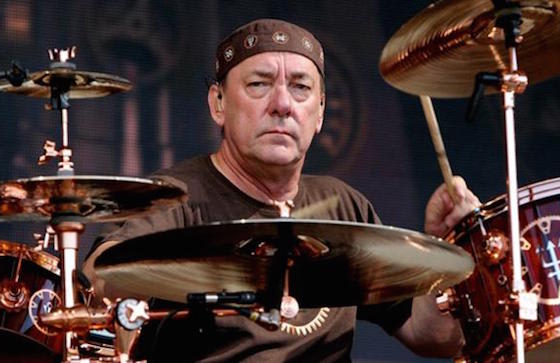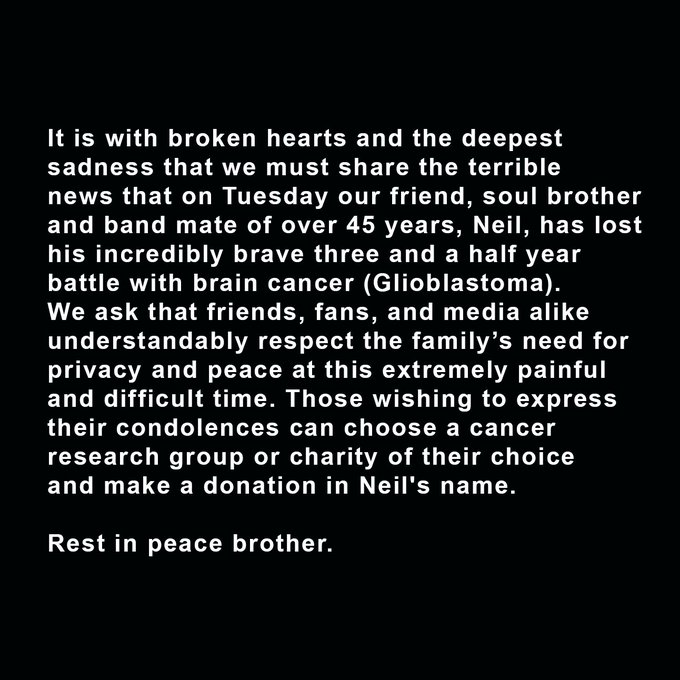Rush drummer and primary lyricist Neil Peart has died at age 67.
Peart's publicist confirmed the drummer passed away in California on January 7 after being diagnosed with brain cancer, CBC reports. Peart's cause of death was confirmed by family spokesperson Elliot Mintz.
"It is with broken hearts and the deepest sadness that we must share the terrible news that on Tuesday our friend, soul brother and bandmate of over 45 years, Neil, has lost his incredibly brave three-and-a-half-year battle with brain cancer (Glioblastoma)," surviving Rush members Geddy Lee and Alex Lifeson wrote in a statement.
"We ask that friends, fans, and media alike understandably respect the family's need for privacy and peace at this extremely painful and difficult time. Those wishing to express their condolences can choose a cancer research group or charity of their choice and make a donation in Neil's name."
Neil Ellwood Peart was born September 12, 1952, and grew up outside of Hamilton in Hagersville, ON. For his 13th birthday, Peart's parents purchased him a pair of drum sticks, a practice pad and lessons with the promise of buying a full drum kit should he continue with the instrument.
Peart was then gifted a drum kit upon turning 14 and began taking lessons at the Peninsula Conservatory of Music. He began playing in local bands around Southern Ontario ahead of travelling to London, England, at 18 in hopes of furthering his career, only to return to Canada after 18 months.
A 21-year-old Peart auditioned to become Rush's drummer in the summer of 1974, following the departure of original drummer John Rutsey. Peart showed up to the audition driving a Ford Pinto, with his drums stored safely in garbage cans.
"I remember thinking, 'God, he's not nearly cool enough to be in this band,'" Lifeson recalled in 2010 band documentary Beyond the Lighted Stage. "And then he started playing, and he pounded the crap out of those drums. He played like Keith Moon and John Bonham at the same time."
Peart officially joined Rush on July 29, 1974, leaving him two weeks to learn the band's entire live repertoire ahead of their first North American tour. Leaving his trash can skins behind, Peart promptly secured a chrome Slingerland drum set and made his live debut at Pittsburgh's Civic Arena on August 14, 1974, where Rush were supporting Uriah Heep and Manfred Mann.
Soon after joining Rush, Peart also became the band's primary lyricist, leaving Lee and Lifeson to focus largely on the instrumental work. His first recording with Rush was 1975 sophomore album Fly By Night, which captured the band a Juno Award for Most Promising New Act.
Peart's early lyrics were largely informed by his love of science-fiction and fantasy literature, in addition to the work of Russian-American writer and novelist Ayn Rand. Fly By Night track "Anthem" features some of Peart's first lyrics to draw upon concepts of individualism and Objectivism. At the same time, the album also marked Lee and Lifeson's pursuit of more complex musical arrangements and songwriting formats, both of which would become Rush's calling cards in the years to come.
Following 1975's Caress of Steel and 1976's landmark 2112, Peart and his Rush bandmates began leaning further into progressive rock trends of the era. Peart expanded his percussion duties to include glockenspiel, wood blocks, gong, chimes and more, while expanding his lyrical mind to focus on social and emotional topics.
After wrapping a tour for Rush's Test for Echo album in 1997, Peart's first daughter and then-only child, 19-year-old Selena Taylor, was killed in a car accident on Highway 401 near Brighton, ON. Peart's common-law wife, Jacqueline Taylor, died of cancer just 10 months later.
Peart then took a lengthy sabbatical from Rush, taking an extensive motorcycle trip throughout North and Central America. He then married photographer Carrie Nuttall in 2000 and returned to Rush in 2001. The regrouped band would then release Vapor Trails in 2002.
Peart's drumming skill and technique have been revered by fans, journalists and fellow musicians for years. First inspired to play the drums by the Who's Keith Moon, Peart also counted drummers such as John Bonham, Ginger Baker, Stewart Copeland, Buddy Rich, Gene Krupa, Bill Bruford, Michael Giles, Phil Collins, Steve Gadd among his influences.
Peart was also revered for his in-concert drum solos, stunning fans not only through playing them on a 360-degree drumkit, but for their displays of his technical and compositional mastery. Peart gave an in-depth look at his soloing in 2005 instructional DVD Anatomy of a Drum Solo.
Peart was made an Officer of the Order of Canada alongside his bandmates in 1996, making Rush the first rock band to receive the honour as a group. Peart and his bandmates were inducted into the Canadian Songwriter Hall of Fame in 2010, ahead their induction into the Rock and Roll Hall of Fame in 2013.
Outside of drumming, Peart was also an accomplished author. His first book, The Masked Rider: Cycling in West Africa, was published in 1996 and chronicled a month-long bicycling tour through Cameroon in 1988. Peart then wrote about a lengthy motorcycle trip taken following the loss of his wife and daughter in 2002's Ghost Rider: Travels on the Healing Road.
Peart's non-fiction catalogue also includes 2004's Traveling Music: Playing Back the Soundtrack to My Life and Times, 2006's Roadshow: Landscape with Drums, a Concert Tour by Motorcycle, 2011's Far and Away: A Prize Every Time, 2014's Far and Near: On Days Like These and 2016's Far and Wide: Bring That Horizon to Me! He also worked with science-fiction author Kevin J. Anderson on the novelization of Rush's final album Clockwork Angels.
In 2015, Peart officially retired from music due to a struggle with chronic tendonitis, as well as in the hope of spending more time with his family.
Peart's publicist confirmed the drummer passed away in California on January 7 after being diagnosed with brain cancer, CBC reports. Peart's cause of death was confirmed by family spokesperson Elliot Mintz.
"It is with broken hearts and the deepest sadness that we must share the terrible news that on Tuesday our friend, soul brother and bandmate of over 45 years, Neil, has lost his incredibly brave three-and-a-half-year battle with brain cancer (Glioblastoma)," surviving Rush members Geddy Lee and Alex Lifeson wrote in a statement.
"We ask that friends, fans, and media alike understandably respect the family's need for privacy and peace at this extremely painful and difficult time. Those wishing to express their condolences can choose a cancer research group or charity of their choice and make a donation in Neil's name."
Neil Ellwood Peart was born September 12, 1952, and grew up outside of Hamilton in Hagersville, ON. For his 13th birthday, Peart's parents purchased him a pair of drum sticks, a practice pad and lessons with the promise of buying a full drum kit should he continue with the instrument.
Peart was then gifted a drum kit upon turning 14 and began taking lessons at the Peninsula Conservatory of Music. He began playing in local bands around Southern Ontario ahead of travelling to London, England, at 18 in hopes of furthering his career, only to return to Canada after 18 months.
A 21-year-old Peart auditioned to become Rush's drummer in the summer of 1974, following the departure of original drummer John Rutsey. Peart showed up to the audition driving a Ford Pinto, with his drums stored safely in garbage cans.
"I remember thinking, 'God, he's not nearly cool enough to be in this band,'" Lifeson recalled in 2010 band documentary Beyond the Lighted Stage. "And then he started playing, and he pounded the crap out of those drums. He played like Keith Moon and John Bonham at the same time."
Peart officially joined Rush on July 29, 1974, leaving him two weeks to learn the band's entire live repertoire ahead of their first North American tour. Leaving his trash can skins behind, Peart promptly secured a chrome Slingerland drum set and made his live debut at Pittsburgh's Civic Arena on August 14, 1974, where Rush were supporting Uriah Heep and Manfred Mann.
Soon after joining Rush, Peart also became the band's primary lyricist, leaving Lee and Lifeson to focus largely on the instrumental work. His first recording with Rush was 1975 sophomore album Fly By Night, which captured the band a Juno Award for Most Promising New Act.
Peart's early lyrics were largely informed by his love of science-fiction and fantasy literature, in addition to the work of Russian-American writer and novelist Ayn Rand. Fly By Night track "Anthem" features some of Peart's first lyrics to draw upon concepts of individualism and Objectivism. At the same time, the album also marked Lee and Lifeson's pursuit of more complex musical arrangements and songwriting formats, both of which would become Rush's calling cards in the years to come.
Following 1975's Caress of Steel and 1976's landmark 2112, Peart and his Rush bandmates began leaning further into progressive rock trends of the era. Peart expanded his percussion duties to include glockenspiel, wood blocks, gong, chimes and more, while expanding his lyrical mind to focus on social and emotional topics.
After wrapping a tour for Rush's Test for Echo album in 1997, Peart's first daughter and then-only child, 19-year-old Selena Taylor, was killed in a car accident on Highway 401 near Brighton, ON. Peart's common-law wife, Jacqueline Taylor, died of cancer just 10 months later.
Peart then took a lengthy sabbatical from Rush, taking an extensive motorcycle trip throughout North and Central America. He then married photographer Carrie Nuttall in 2000 and returned to Rush in 2001. The regrouped band would then release Vapor Trails in 2002.
Peart's drumming skill and technique have been revered by fans, journalists and fellow musicians for years. First inspired to play the drums by the Who's Keith Moon, Peart also counted drummers such as John Bonham, Ginger Baker, Stewart Copeland, Buddy Rich, Gene Krupa, Bill Bruford, Michael Giles, Phil Collins, Steve Gadd among his influences.
Peart was also revered for his in-concert drum solos, stunning fans not only through playing them on a 360-degree drumkit, but for their displays of his technical and compositional mastery. Peart gave an in-depth look at his soloing in 2005 instructional DVD Anatomy of a Drum Solo.
Peart was made an Officer of the Order of Canada alongside his bandmates in 1996, making Rush the first rock band to receive the honour as a group. Peart and his bandmates were inducted into the Canadian Songwriter Hall of Fame in 2010, ahead their induction into the Rock and Roll Hall of Fame in 2013.
Outside of drumming, Peart was also an accomplished author. His first book, The Masked Rider: Cycling in West Africa, was published in 1996 and chronicled a month-long bicycling tour through Cameroon in 1988. Peart then wrote about a lengthy motorcycle trip taken following the loss of his wife and daughter in 2002's Ghost Rider: Travels on the Healing Road.
Peart's non-fiction catalogue also includes 2004's Traveling Music: Playing Back the Soundtrack to My Life and Times, 2006's Roadshow: Landscape with Drums, a Concert Tour by Motorcycle, 2011's Far and Away: A Prize Every Time, 2014's Far and Near: On Days Like These and 2016's Far and Wide: Bring That Horizon to Me! He also worked with science-fiction author Kevin J. Anderson on the novelization of Rush's final album Clockwork Angels.
In 2015, Peart officially retired from music due to a struggle with chronic tendonitis, as well as in the hope of spending more time with his family.
Canadian rock drummer Neil Peart dead at 67. Peart, primary lyricist for Rush, was known for his technical proficiency, and for weaving jazz and big band patterns with a hard rock style. Publicist says Peart died in California January 7. Background: https://t.co/r0QKiYdpdu
— CBC News Alerts (@CBCAlerts) January 10, 2020
Neil Peart September 12, 1952 - January 7, 2020





